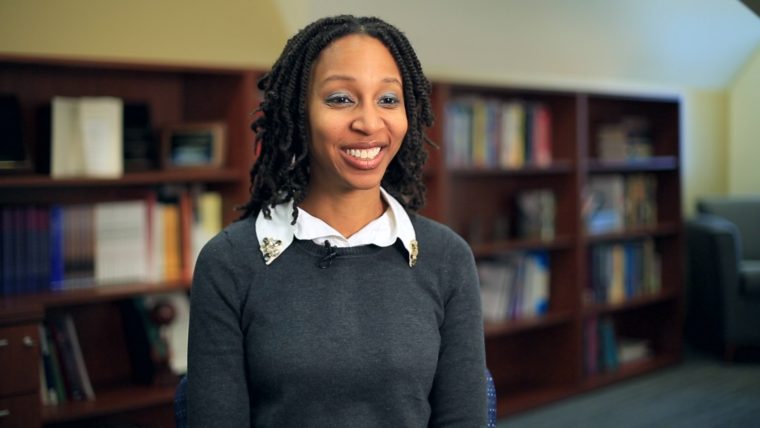Adia Harvey Wingfield, professor of sociology in Arts & Sciences at Washington University in St. Louis, recently was elected president of Sociologists for Women in Society (SWS), a national organization dedicated to improving the social position of women through feminist sociological research and writing.
Wingfield begins her one-year term as president-elect in February, when SWS holds its winter meeting in Albuquerque, N.M. She will be responsible for planning the organization’s next winter meeting and will serve as its president through 2018.
Wingfield’s research focuses on social processes that maintain racial and gender inequality in professional occupations. She is a contributing writer for The Atlantic and the author of several books, most recently “No More Invisible Man: Race and Gender in Men’s Work” (Temple University Press).
Here, she comments on her plans for SWS, sociology and gender research, and why academics need to engage in public discourse.
Could you give some background on the organization and what you’re hoping to accomplish as its president?
As the name suggests, the sociologists in our organization focus on issues facing women in society, but we realize there’s a lot of ground to cover in this category. We’re interested in the issues facing women in families, work, school and other settings, but we also explore the challenges facing women of color, women in queer or trans communities, and women of different religious or ethnic backgrounds. Following the recent election, there are many women in these groups who are feeling vulnerable. We’ve seen a real spike in hate crimes and violence, so the fear they’re feeling is not irrational. It’s a visceral response to a real and substantial threat.
Now, more than ever, we need to use our expertise on social issues to help shape national policies.
As president of SWS, I’ll be looking for ways to enlist our membership in coming battles over gender inequality, racism, homophobia and other issues that threaten the well-being and safety of women. Now, more than ever, we need to use our expertise on social issues to help shape national policies. We need to stand up and speak out for the disadvantaged and marginalized members of society. We have a lot of work to do, perhaps more than I realized when I agreed to run for office at SWS. But I’m confident that sociology has the tools necessary to address these issues and to bring about concrete changes for the better.
Your research has a strong focus on the ways that gender intersects with race and class to shape economic, social, political and cultural outcomes. What are the benefits of addressing gender issues from a sociological perspective?
Sociology brings powerful research methods and tools to the discussion of a wide range of important gender issues facing the world today. If you look at these issues on the surface, it’s easy to make the assumption that there’s something inherently different about women that leads to these gender disparities. Sociology allows us to show that these gender differences are often a function of broader structural forces and social institutions that traditionally have caused people and systems to behave in a certain fashion. The better we understand the real root causes of these disparities, the more prepared we are to engage in efforts aimed at changing them.
In addition to your academic publications, you’ve done a lot of writing for public audiences, including a series of essays on workplace issues for The Atlantic. Do academics have an obligation to share their expertise with people outside of their disciplines?
It’s critically important for all academics, and especially for sociologists, to make sure their views on important issues are made accessible to the general public and to policymakers. So many of the social issues and problems that we study — immigration, wage gaps, demographic changes — are so relevant to wider audiences that we do them a disservice if we only discuss them in journal articles, with the students in our classes or other scholars in our discipline.
We need to be at the forefront of shaping legislative policy, teaching and engaging in social justice work about issues that are central to how society functions.
Much of the research that we do has keen implications for navigating a world that has changed dramatically in a matter of decades; it’s important for making sense of whether and how these changes are necessary, reactionary and/or potentially harmful and problematic.
Our work should not be cordoned off into an ivory tower or circulated only among other like-minded researchers. We need to be at the forefront of shaping legislative policy, teaching and engaging in social justice work about issues that are central to how society functions. When we can bring sociological insights into the ways everyday citizens shape their realities, as well as the institutions that shape social life, we maximize our discipline’s strength and potential.
